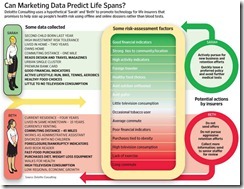Insurers use social networking sites to identify risky clients
Of all the fun topics in IT going around at the moment, privacy is a good one. There is a lot of press about privacy online and how we are all doomed, however looking at the share price of Google and Facebook, ignoring privacy seems to make pretty good business sense. There are so many different angles that need to be looked at, however there are a couple that stuck out recently.
The Wall Street Journal ran an article a few weeks back that made my eyebrows rise…
Insurers have long used blood and urine tests to assess people's health—a costly process. Today, however, data-gathering companies have such extensive files on most U.S. consumers—online shopping details, catalog purchases, magazine subscriptions, leisure activities and information from social-networking sites—that some insurers are exploring whether data can reveal nearly as much about a person as a lab analysis of their bodily fluids
Well that could be another incentive to curb what you post on Facebook! There is even has a nice graphic to illustrate how Deloitte is telling insurers that they can profile people based on their ‘Marketing Data’ – very pretty and rather disturbing…
You then start adding in other snippets of privacy news like ‘NHS Choices allowing Facebook tracking’ and you can see all of this is going to end in tears:
Tom Watson MP, Labour MP West Bromwich East, has written to secretary of State Andrew Lansley, asking him to take steps to remove the tracking code from the NHS Choices Website.
“I write to you to express my concern that the NHS is allowing Google, Facebook, and others to track your https://www.nhs.uk/ browsing habits, regardless of the fact that people use the page to seek medical advice.”
Watson urges the minister to take action and imagine how embarrassed he would be, if as a user of NHS Choices, he searched on an embarrassing condition like genital warts, and the data were made available to third parties.
In the great rush of sites to bring in social web features, they have to be aware that adding a ‘Like’ button to the page will send Facebook (in this case) information about you - even if you do not click it and are not logged into Facebook. (See https://mmt.me.uk/blog/2010/11/21/nhs-and-tracking/ for a more technical analysis).
We need to do better in explaining the potential issues; they are complex and not all the implications of our avid data sharing are yet apparent.
